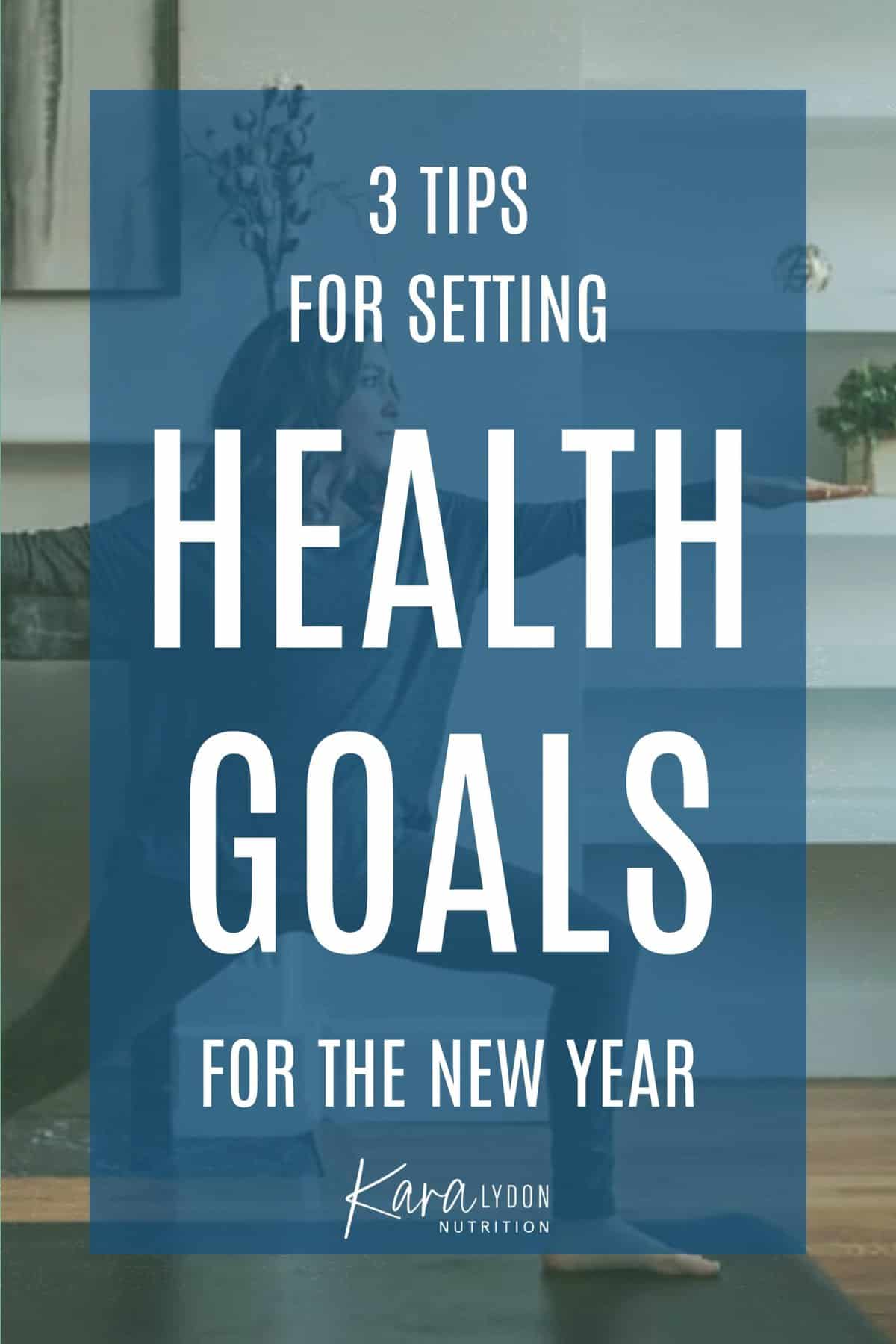

If you’re tired of setting health or weight loss resolutions each year that don’t work for you, I’m sharing three tips for changing your goal setting strategy so that you actually can sustain your intentions this year.
Are you tired of setting New Year’s resolutions that you can’t keep?
Does it feel like the same old song and dance every January? You are super motivated starting January 1 and by the end of the month you’ve lost steam?
Do your resolutions sound something like:
“I’m going to lose 15 lbs by March.”
“I will workout at the gym every day for a month.”
“I’m going to cut out carbs.”
If so, you’re not alone! Our culture has completely normalized setting new year’s resolutions all around weight loss and extreme, unsustainable diet and exercise regimes.
Why don’t these types of resolutions work?
They’re rooted in all-or-nothing mentality. For example, working out every single day is the “all” in all-or-nothing mentality. Then what typically happens is you get so burnt out from going to the gym every single day that you stop and then you don’t go at all (switched to “nothing”).
They’re based in scarcity mindset. Cutting out all carbohydrates creates a scarcity mindset, which can actually backfire and make you feel out of control around carbs and result in you eating an amount that makes you feel uncomfortable or even sick.
They’re centered around trying to micromanage your body size. Weight is a complex science and is influenced by so much beyond just diet and exercise. When people set goals to lose weight, they typically have to resort to unhealthy or extreme behaviors that aren’t sustainable to see results. And then once they lose the weight, they start to go back to some of their old behaviors and patterns, and the weight comes back on. Enter the vicious cycle of yo-yo dieting and weight cycling.
How do we set health goals for the new year that are actually sustainable?
(this assumes you value health and want to set health goals but health is not a moral issue and you don’t have to value health to be worthy).
1. Change the language. Set intentions, not resolutions.
This may seem trivial but I believe that the language we use shapes how we feel and act. The definition of resolution is “a firm decision to do or not do something.” It feels more rigid and black-and-white to me – like if you set a resolution you either succeed or you fail and there’s no space in-between. How does that word feel to you? Does it bring up fear or pressure or does it make you feel excited and expansive?
The word intention feels much more flexible and fluid. An intention is an aim or a plan. You can set an intention or aim to do something and then change course if your circumstances change or you realizing something isn’t working for you. I believe in coming back to our intentions or goals every few months and checking-in with yourself. Is this intention still serving me? Is it still realistic and doable? If not, how could you tweak it to be more achievable or to serve you better?
I personally have enjoyed setting a word for the year to guide my choices and decisions rather than setting concrete goals. I view it as a theme or a larger intention.
When you change the language, you change your mindset, and when you change your mindset, you approach change with more flexibility and grace.
Resolutions set you up for shame. Intentions set you up for self-compassion. The latter is a motivating force; the former stalls progress.
2. Focus on health-promoting behaviors, not weight loss.
Weight is largely outside of our control. Sure, extreme behaviors can result in weight loss but those behaviors are not sustainable and it’s nearly impossible to maintain the weight loss. When you’re pursuing intentional weight loss, you’re working against your body’s natural set point (a range of 5-20 lbs. that your body is comfortable in and doesn’t fight against any subtle fluctuations in weight). When you work against your body’s set point or genetic blueprint, the weight it feels most comfortable at, you’re working against your own physiology, which is why it’s not sustainable, and you wind up putting the weight back on. Body diversity is real and we are not all meant to be the same size. Just as we’re not all meant to be the same height or shoe size, we’re not all meant to be the same weight. If you truly value health, consider that research shows it’s healthier to stay at a higher weight than it is to weight cycle (i.e. lose weight and put it back on, repeat).
Instead of focusing on weight which we can’t control, set intentions based on health-promoting behaviors that are actually within your control. You might not be able to control the number on the scale, but you can control adding a piece of fruit with your breakfast. Studies show that health markers improve with health-promoting behaviors even if there’s no change in weight.
What are some examples other health-promoting behaviors?
Getting an extra hour of sleep.
Walking to the store instead of taking the car.
Adding a vegetable to dinner.
Eating every few hours.
Wearing your seatbelt.
Drinking more water.
Setting aside 5 minutes most days to meditate.
Scheduling an appointment with a therapist.
These are all intentions and goals that are within your control (assuming you have access and financial privilege to do so). Instead of using the number on the scale as a metric for success, take note of your energy levels, your mood, how you feel physically, your sleep, stress levels, and your health markers (like blood pressure, cholesterol, A1C, etc.).
3. Focus on setting intentions with an abundance mindset.
Focusing on what we can’t do or what we can’t have puts us into a scarcity or deprivation mindset. Have you ever been in the room with a toddler and you tell them they can play with any toy in the room except that one thing that’s off-limits? Guess what they’re going to want to play with? The forbidden fruit! We’re wired the same way as adults.
If you tell yourself you can’t have bread or ice cream or pasta, guess what you’re going to be thinking about all. the. time? Rather than setting goals with a deprivation mindset, set intentions centered around abundance. What do you want to invite more of into your life?
This might look like adding more fruits and vegetables to your day vs. avoiding carbs. It might look like adding more whole grains to your week instead of cutting out white rice.
Also, ask yourself, what actually lights you up? What feels good to you physically, mentally, and spiritually? If you’re setting intentions around doing things you don’t really want to do but think that you should, it won’t be sustainable.
Let’s say you hate the gym but you feel like you have to get on the treadmill, you’re probably going to leave the gym not feeling that energized or inspired. What if you set an intention around a form of movement you actually enjoy, even if you don’t think it “counts,” like yoga or barre. If you pursue things you actually enjoy, you’re more likely to do them!
For More Tips on a Non-Diet New Year, check out my posts below:
10 Non-Diet New Year’s Resolutions
Are you on the hunger fullness diet?
The Last Supper Syndrome
The Beginner’s Guide to Intuitive Eating
How will you set goals or intentions this year? Tell me in the comments below! We’ll continue the conversation over on Instagram so be sure to follow me there if you’re not already! And if you want more support, make sure you’re subscribed to my email list so you never miss a newsletter!
